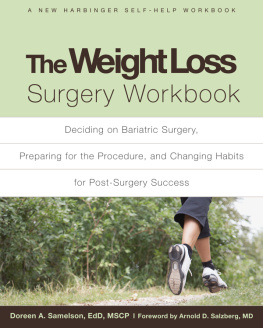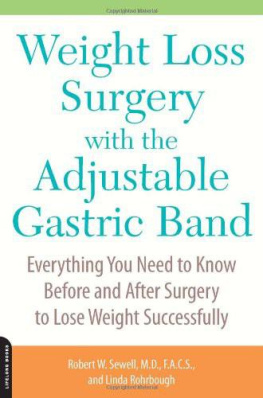FOREWORD
W eight-loss surgery is a much-debated topic. Wherever you look in the mediain newspapers, on the Internet, on TV, on social networking sites like Facebook and Twittereveryone seems to have something to say about it. And while its fantastic that awareness is being raised and important issues are being discussed, this barrage of opinions can lead to misconceptions and confusion among the public and those who might be considering the surgery.
The truth is that weight-loss surgery has never been more popular or more successful at helping obese people lose significant amounts of weight on a permanent basis. It rightly deserves to be perceived as a hugely positive procedure, helping people to live longer, happier, and healthier lives.
The WeightLoss Surgery Cookbook is all about demystifying the journey that bariatric surgery patients will travel after this life-changing operation. It lays out, in simple terms, the nutritional facts for those who are considering having a bariatric operation and provides useful information for those who have already undergone weight-loss surgery.
This book doesnt advise on which surgical procedure to chooseonly your team of bariatric experts can do that. Instead, this is a nutrition and recipe book designed to help you maximize your success after surgery. It will rekindle enthusiasm in bariatrics who believe they might never eat normally again. It will show those who feel that they cant control their eating that, in fact, they canwith nutritious food, healthier choices, and support at every step of the way, regardless of their surgical procedure. It will help people learn that a new bariatric eating program will be low in fat and sugar, high in protein and fiberas well as bursting with flavor and exciting new textures and tastes. The advice, tips, recipes, and cooking ideas on these pages will guide you through the post-surgery maze and make your experience as rich and rewarding as possible.
To put it simply, by following the information in this book, you will give yourself the very best chance of reaching your ultimate weight-loss goal.
INTRODUCTION
I ts no secret that obesity is on the rise across the globe. It has now reached epidemic proportions; in fact, the prevalence of obesity nearly doubled between 1980 and 2008. According to figures from the World Health Organization (WHO) in 2008, more than 1.4 billion adults were overweight and half a billion were obese. Of these, a staggering 2.8 million people will die each year as a result of this obesity. Its not just a problem for adults, either; in 2008, more than 40 million preschool children around the world were overweight.
What Is Obesity?
Obesity is broadly defined as abnormal or excessive fat accumulation that may impair health. The body mass index (BMI) is commonly used to classify whether an adult is overweight or obesethis is the weight in kilograms divided by the square of the height in meters. The WHO defines overweight as having a BMI of 25 or more, obesity as a BMI of 30 or more, and morbid obesity as a BMI of 40 or more.
What Causes Obesity?
The fundamental cause of obesity is an energy imbalance between calories consumed and calories burned. However, its far more complicated than that.
Across the globe, people are eating more high-fat foods and engaging in less physical activity due to sedentary jobs and living in cities with numerous modes of transportation. Technological and sociological changes are contributing to the problem.
Genetics also play a part. In fact, genes are thought to be responsible for up to 70 percent of a persons weight gain, as they can control a persons appetite, satiety, and metabolism. Willpower and lifestyle choices can also have a profound impact on a persons weightso its not a simple issue or a straightforward equation.
The Price of Obesity
The long list of severe health complications associated with obesity includes type 2 diabetes, high cholesterol, arthritis, high blood pressure, heart disease, depression, physical disabilities, and certain cancers.
At its simplest, obesity is highly disabling and can result in premature death. Factor in comorbidities, like diabetes and heart disease, and you can see that life can be shortened considerably through being overweight.
Physically, financially, and emotionally, the cost of obesity on an individual is very significant, but its also costly to the nation. The economic costs through loss of work, additional health care needs, and incapacity benefits for those too ill to work are rising significantly.
Solutions
Anyone who has struggled with their weight will recognize that a lot of factors play a role in their weight management. Its naive to think that a one size fits all solution exists.
Research has shown us that diets often fail. Only a mere 5 percent of dieters lose their excess weight and keep it off long-term. The remaining 95 percent often yo-yo between one diet and the next, each time increasing their starting weight.
For some people, the final option is bariatric or weight-loss surgery. For those who have tried the usual, traditional methods of weight loss without success, surgery may be the only solution.
Bariatric surgery has been proven to be the most effective and longest-lasting treatment for morbid obesity and many related conditions. There is also mounting evidence to suggest that it may be among the most effective treatments for metabolic diseases and conditions, including obstructive sleep apnea, high cholesterol, nonalcoholic fatty liver disease, hypertension, and type 2 diabetes.
Surgery for the morbidly obese goes way beyond weight loss, for not only are the comorbidities above improved, but joint disease, asthma, and fertility can also be dramatically improved or resolved.
Bariatric surgery can typically lead to a 50 percent loss of excess weight over five years. For gastric bypass patients this can be higher, up to an average of 65 percent to 70 percent.
What Is Weight-Loss Surgery?
Weight loss, or bariatric, surgery can be a gastric band, gastric bypass, gastric sleeve, duodenal switch, or other revision surgery. It should be viewed as the beginning of the solution to obesity, rather than an end in itself. The surgery is simply a tool to help with weight loss.
Anyone who thinks the operation itself is a magic wand or the easy way out or cheating is sadly mistaken. This couldnt be further from the truth. Surgery is just the start; what you do afterward is the real key to success. Unfortunately, weight loss isnt easy, with or without surgery. (If it were, we would all be slim!)
Many find that the really hard work, both emotionally and physically, begins after their operation. Patients have to learn a new way of eating, break bad habits and destructive patterns that hamper success, develop new coping skills, and become more active for a sustainably healthy life.
Thats why its crucial that you seek out support from friends, family, your bariatric medical team, and other weight-loss surgery patients during this challenging time. Its also the time to arm yourself with as much valuable advice as possibleincluding this bookto ensure success, both during the weightloss days and later during the maintenance phase.
The Many Benefits of Weight Loss
As with any kind of major surgery, undergoing a bariatric operation is not without risk. However, the majority of patients would agree that the health rewards gained far outweigh the possible complications.
Losing weight does so much more than just get you into a pair of skinny jeans. It can boost your fertility, improve your sex life, and improve or reverse conditions such as chronic pain, type 2 diabetes, sleep apnea, high blood pressure, and high cholesterol. Youll also feel much more energetic and confident.
Next page











